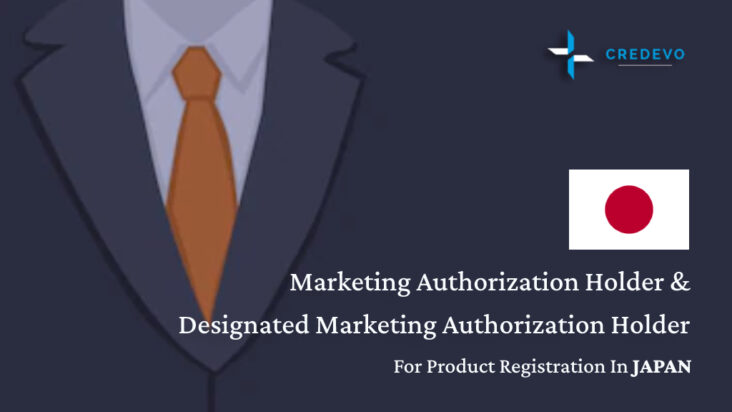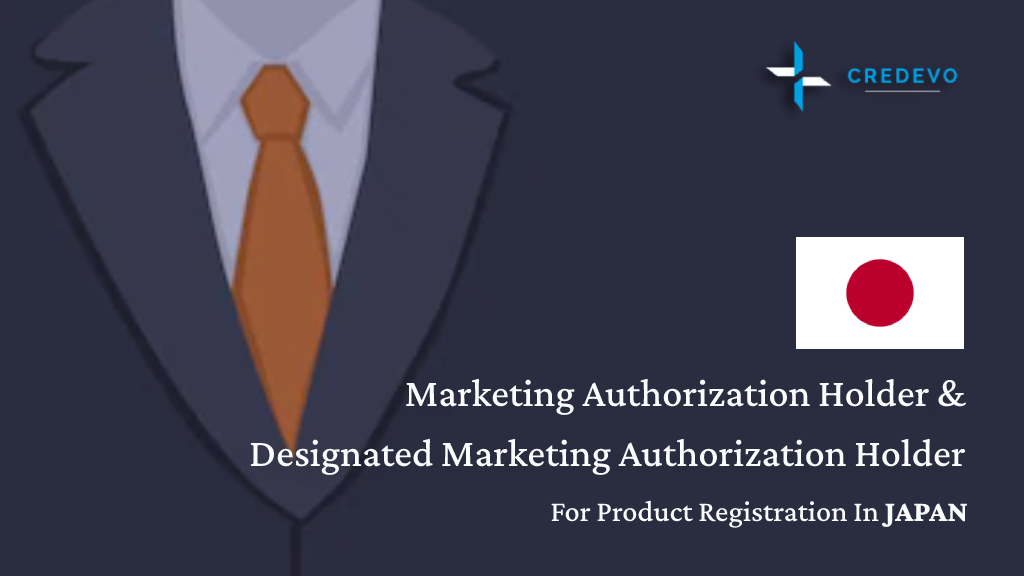Marketing Authorization Holder (MAH) & Designated Marketing Authorization Holder (DMAH) For Product Registration In JAPAN

If you plan to register a healthcare product in Japan, previously you would need an In-country caretaker system. After the revision of the Pharmaceuticals and Medical Device (PMC) Act, the Marketing Authorization Holder (MAH) and Designated Marketing Authorization Holder (DMAH).replaces the In-country caretaker system

The foreign manufacturer who plans to register their products in Japan must follow regulatory requirements. The Pharmaceuticals and Medical Devices Agency (PMDA) provides these requirements, which was established and came into service on April 1, 2004. The PMDA operates under the Ministry of Health, Labor, and Welfare (MHLW). These two-government organizations handle various activities, from approval reviews to post-market surveillance.
In the pharmaceutical sector, Japan is one of the large, most attractive, and most lucrative markets for pharmaceutical companies, and experts predict it to grow further.
Japan imports medications from countries like the USA, Germany, and European countries. One of the reasons is that Japan has the highest number of aged individuals, which results in a rise in healthcare spending. Though Japan has numerous medical device manufacturing companies, the country also imports a considerable number of medical devices.
Marketing Authorization Holder (MAH)
The Marketing Authorization Holder (MAH) makes an application for approval of a medical device on behalf of the foreign manufacturer.
The MAH is a Japan-based company or a legal entity residing in Japan. The MAH is the official holder of the product approval and can not be changed easily. Hence while appointing a MAH, it is crucial to decide with due diligence thoroughly.
What does a Marketing Authorization Holder (MAH) do?
The marketing Authorization Holder (MAH) manages the product registration and becomes the owner of the approval/certification. He will have control over the manufacturer’s device and market commercialization.
When the manufacturer requires to submit a supplement application or a transfer application of the approval/certification, the MAH can submit such an application under their purview. The MAH does not require a signature by a foreign manufacturer. This is because the MAH is the owner of the product approval.
If a foreign manufacturer requires to retain control, They may appoint a Designated Marketing Authorization Holder (DMAH).
Know the regulations to register your Drugs, Biologics, Generics, Medical Device, Cosmetics, Nutraceuticals (food products in Japan.
Designated Marketing Authorization Holder (DMAH)
- The DMAH acts as the representative for the foreign manufacturer during and after product registration.
- The foreign manufacturer controls the registration of the product. The foreign manufacturer is the applicant and becomes the owner of the approval/certification.
- The DMAH can apply for product registration but requires a signature by the foreign manufacturer.
- When the sponsor requires the submission of a supplement application or a transfer application of the approval/certification, a signature by the foreign manufacturer representative is necessary, although the DMAH applies.
If the foreign manufacturer wants to change their DMAH, the process is simple compared to changing their MAH.
Who can be MAH/DMAH
- A distributor
- An independent third party located in Japan
- The foreign medical company’s subsidiary in Japan has,
- Its own office in Japan.
- GQP/GVP Conformity.
Advantages & disadvantages of appointing entities as MAH/DMAH
Distributor
Pro: Appointing the distributor as MAH/DMAH is cost-saving. This is because they offer MAH services without any charges or fees and expect profit from the sale of foreign products.
Con: There are risks associated with the confidential intellectual information of the product. Also changing distributors in the future might be a difficult task as the distributor holds a license and control of the product.
An independent third party located in Japan
Pro: Appointing an independent third party as your MAH facilitates marketing flexibility and increased control. In this situation, product registrations and licenses can be under the manufacturer’s name instead of the distributor’s. Changing distributors is far simpler when the registration is under your name with the independent third-party MAH/DMAH.
Con: The manufacturer has to pay the Fees for the registration of the product as well as monthly fees for the MAH/DMAH services.
The foreign medical company’s subsidiary in Japan
Pro: A midsize company or large company which has a subsidiary company or branch office in Japan can use them as MAH/DMAH.
Con: For small-size companies, this option is not very cost-effective. Establishing a subsidiary or branch office in Japan requires different permissions and legal obligations and also should meet MHLW’s MAH standards.
MAH or DHAM handles the following operations
A Marketing Authorization Holder (MAH) or Designated Marketing Authorization Holder (DMAH) undertakes the following operations.
- MAHs must maintain a Device Master File that corresponds to the documentation submitted to the agency.
- Supervising and managing the manufacturer
- Handling the product registration process and maintaining the product approvals
- Managing product quality and safety and ensuring that all manufacturing sites comply with Japan’s Quality Management System (QMS) requirements
- Managing product storage in an establishment with MAH licensing
- Administering product releases to distributors or other sales groups
- Manage post-market surveillance.
To import and market in Japan, the MAH acts as a representative for those products and is responsible for their compliance, import, safety, and quality assurance on behalf of the foreign manufacturer.
Foreign Special Approval System (FSAS) & DMAH
Japan’s Ministry of Health, Labour, and Welfare (MHLW) permits manufacturers of Class II, III, and IV devices to register their products through the Foreign Special Approval System (FSAS).
This registration route allows the foreign manufacturer to register their product under their name instead of the MAH’s. This means a foreign manufacturer can be a quasi MAH, and they must appoint a Designated Marketing Authorization Holder (DMAH) who will take regulatory responsibility for activities outlined in the Japan QMS and GVP Regulations.
Controllers in MAH or DMAH
The following controllers can make up MAH or DMAH, with each having its role in the supervision of marketing, manufacturing, and the release of the product.
General Manager
- GM guarantees quality, marketing, and safety standards of the products are at par and oversees all MAH responsibilities.
- A General manager should be a graduate with a Bachelor’s Degree in engineering or science with experience in the post of post-marketing safety or quality assurance position at a pharmaceutical or medical device company.
Post Marketing Safety Controller
- A person should have demonstrated a good experience in the Good Vigilance Practice (GVP).
- The controller must conduct post-marketing surveillance, assess safety information, train other personnel in safety assurance, and design and implement measures to improve safety.
- One must notify the PMDA must if any adverse events that occur. In addition, the Post-Marketing Safety.
- The controller manages all the proper documentation, which includes the filing of product safety information.
These documents should be available as preparation for a possible inquiry by the PMDA.
Quality Assurance Controller
- Quality Assurance Controller manages the Good Quality Practice (GQP) of products.
- The PAL requires the Quality Assurance Controller to ensure compliance with GQP standards and the new GMP requirement based on the Japanese adaptation of ISO 13845:2003.
- SOPs for GQP include quality control at local offices, product storage controls, product release into the market, operation of product recalls and audits and maintenance of all quality assurance reports and documents.
- Another duty of the Quality Assurance Controller is the formation and application of the plan of design and development. It includes design, verification, validation, and ways to test product safety and efficacy.
- The Quality Assurance Controller is also in charge of ensuring that the manufacturing facility meets the new GMP regulations.
- Before approving a product, the PMDA may conduct GMP inspections, oftentimes even if the facilities are overseas.
- Application and maintenance of a Quality System for the product is the responsibility of the Quality Assurance Controller.
Foreign Manufacturer Registration (FMR) in Japan
Besides appointing MAH or DMAH, a foreign manufacturer planning to produce drugs, quasi-drugs, APIs, or medical devices overseas and import them into Japan must register with the MHLW.. This process is known as Toroku, or Foreign Manufacturer Registration (FMR).
It is a separate process from the product registration process and is necessary to obtain product registration approval. Previously, it was known as Foreign Manufacturer Accreditation (FMA) or Accreditation of Foreign Manufacturers (AFM).
For FMR, Japanese regulatory officials from the Pharmaceutical and Medical Device Agency (PMDA) conduct audits via documentation inspection and as well a few site inspections. They assessed the manufacturing sites or facilities to confirm that the foreign manufacturer complies with all PMDA regulations and is eligible for the product registration process.
For a site inspection, these PMDA regulation officials may inspect the following sites for each product
- Design facility: The facility where the design and development records for the product are maintained and the person responsible for the manufacturing operations working at such facility.
- Main assembling plant: The facility where one performs the assembling (filling) processes; this facility is primarily responsible for Quality Management System (QMS) compliance or product realization.
- Sterilizer: The facility where one performs the sterilization process for a product (for sterile medical device products).
Requirements for the documentation of FMR
- Application for registration (Form 63-5)
- Document stating the applicant is not intoxicated or under the influence of illegal substances
- Curriculum vitae of the representative of the facility to be registered
- Drawings or maps of facility premises or areas
Previously PMDA would conduct on-site inspections where the applicant shall submit manufacturing facility information like floor plans and production process flowcharts.
But after the revision regulation in 2014, Buildings and Facilities Regulation (BFR) compliance is no longer a prerequisite for the application. This means that applicants no longer need to submit manufacturing facility information such as floor plans and production process flowcharts for the FMR application unless the PMDA recommends on-site inspection if necessary.
FMR certificate validity is for five years. The MHLW recommends beginning the application process of renewal at least five months in advance of the expiration date of the FMR certificate.
Need support to register your medical device in Japan?
Along with regulatory services for healthcare products in Japan, Credevo also offers MAH/DMAH services required for managing your products in Japan. Submit your details below to connect with us and explore our services.